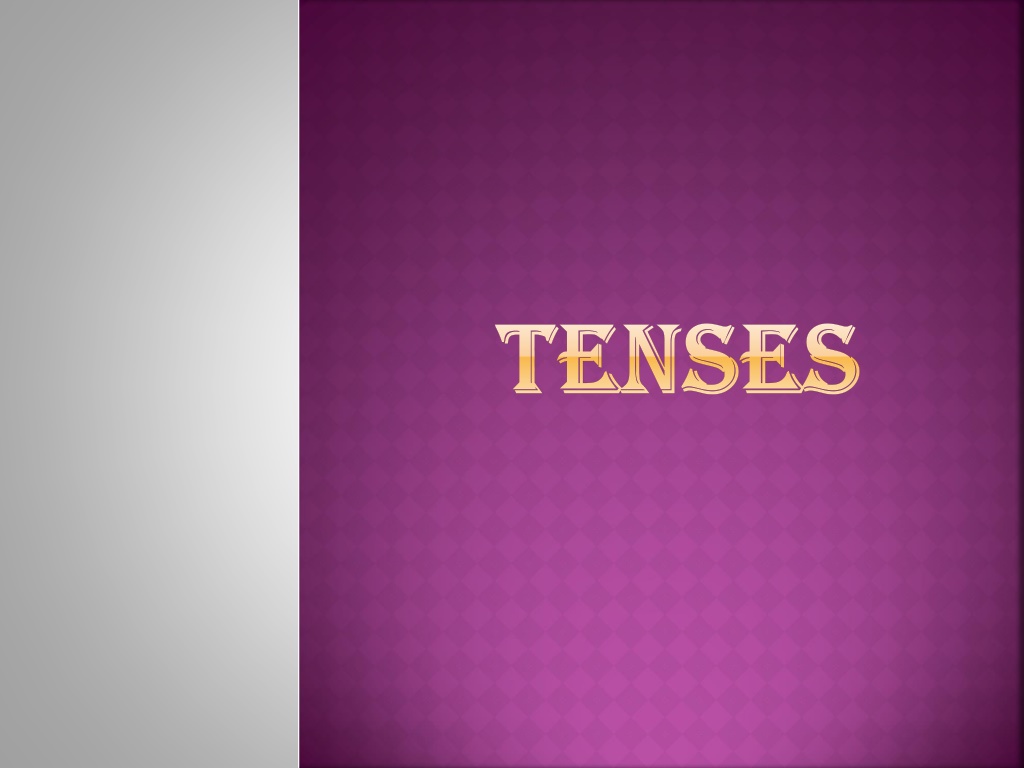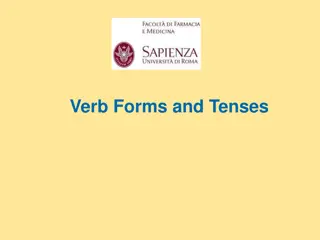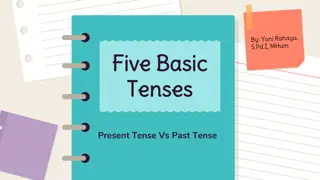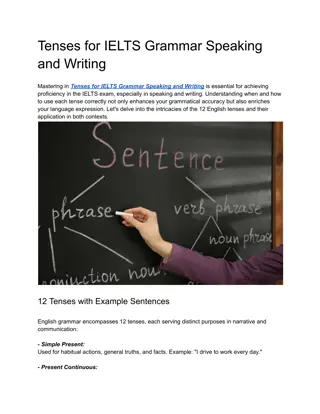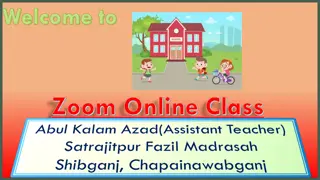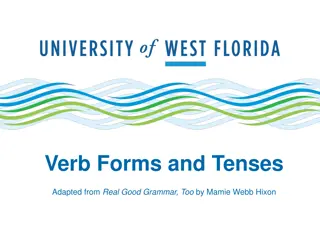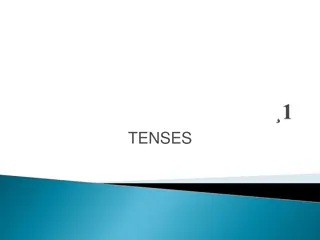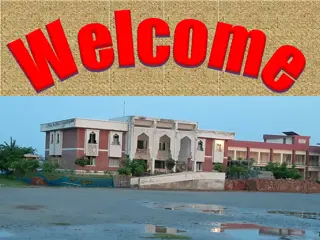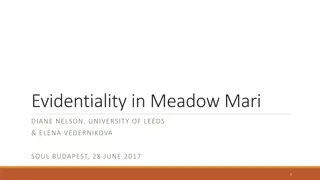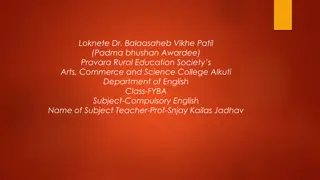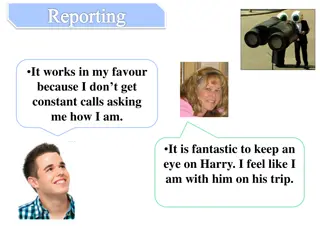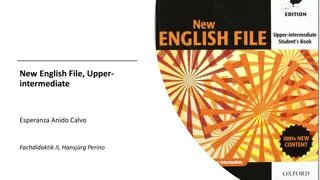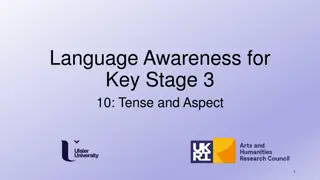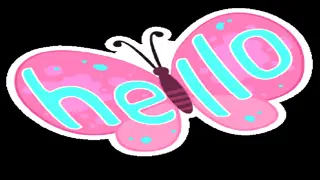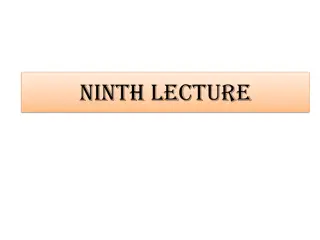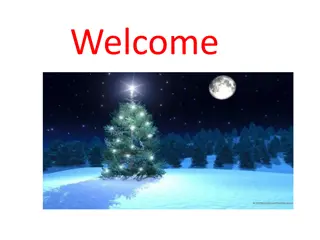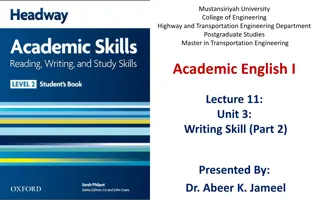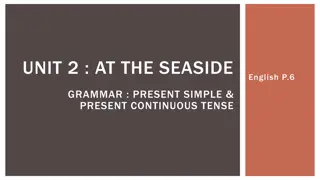Mastering English Tenses: A Comprehensive Guide
Explore the world of English tenses with this detailed guide covering past, present, and future tenses. Learn about simple, perfect, continuous, and perfect continuous forms with examples and explanations. Enhance your understanding of verb tenses and improve your language skills.
Download Presentation

Please find below an Image/Link to download the presentation.
The content on the website is provided AS IS for your information and personal use only. It may not be sold, licensed, or shared on other websites without obtaining consent from the author.If you encounter any issues during the download, it is possible that the publisher has removed the file from their server.
You are allowed to download the files provided on this website for personal or commercial use, subject to the condition that they are used lawfully. All files are the property of their respective owners.
The content on the website is provided AS IS for your information and personal use only. It may not be sold, licensed, or shared on other websites without obtaining consent from the author.
E N D
Presentation Transcript
TENSES TENSES
PREVIOUS KNOWLEDGE- VERB- denotes any action HELPING VERB- verb that support main action MAIN VERB- main action For example- He will write a letter. Write (main action) Will (helping verb or supporting verb)
INTRODUCTION- Definition- Tenses denotes the time an action takes place, whether sometimes in the past, in the present or will take some time in the future. TENSES PRESENT PAST FUTURE For example- Rahul plays.(present) Rahul played.(past) Rahul will play.(future)
PAST TENSE Simple Past Tense- Indicates an action took place before the present moment. For example- He danced in the function. Past Perfect Tense-Indicates an action in the past that had been completed before. For example- He had danced in the function. Past Continuous- Indicates an action going on at some time in the past. For example- He was dancing in the function. Past perfect Continuous- Indicates an action took place before another time and continued dring the second time in the past. For example- He had been dancing in the function.
PRESENT TENSE Simple Present Tense- Indicates an action that shows a habit. For example- He writes a letter. Present Perfect Tense-Indicates an action that has been completed before the present moment. For example- He has written a letter. Present Continuous- Indicates an action taking place at the time of speaking. For example- He was writing a letter. Present perfect Continuous- Indicates an action started in the past and is continuing at the present time. For example- He has been writing a letter.
FUTURE TENSE Simple Future Tense- Indicates an action that will take place after the present time. For example- She will visit her grandmother. Future Perfect Tense-Indicates an action in the future that will have been completed before another time. For example- She will have visited her grandmother. Future Continuous- Indicates an action in the future that is longer in duration than another in the future. For example- She will be visiting her grandmother. Future Perfect Continuous- Indicates an action in the future that will have been continuing until another time. For example- She will have been visiting her grandmother.
TENSE CHART PRESENT No Helping verb/ V1 PAST Main verb V2 FUTURE H.V- will/shall M.V- V1 SIMPLE CONTINUOUS H.V- is/am/are M.V- V1+ ing H.V- was/were M.V- V1+ ing H.V- will be/shall be M.V- V1+ ing PERFECT H.V- has/have M.V- Past Participle/V3 H.V- had M.V- Past Participle/V3 H.V- will have /shall have M.V- Past Participle/V3 PERFECT CONTINUOUS H.V- has/have been M.V- V1+ ing H.V- had been M.V- V1 + ing H.V- will have been/shall have been M.V- V1+ ing
POINTS TO REMEMBER: Subject- Verb agreement rule should be followed while framing the sentences in different form of sentences. In most of the sentences, singular verb will go with singular subject and plural verb with plural subject. Usage will differ in case of first person, second person and third person pronoun Different verb forms should be learned I- am/are/was/have/shall He/She- is/was/has We/ They- are/were/have You- are/were
TO DO EXERCISE: Q1. Choose the correct verb from those in brackets: a. The earth _____ round the sun. (move, moves, moved) b. My friends _____ the film yesterday. (see, saw, have seen) c. It started to rain while we _____ tennis. (are playing, had played, were playing) d. I _____ English for five years. (have been studying, study, am studying) e. The train _____ before we reach the station. (arrives, will have arrived, had arrived) f. Don't disturb me. I _____ my work. (do, did, am doing) g. Fortune _____ the brave. (is favouring, will favour, favours) h. I _____ the letter before you arrived. (had written, wrote, will write) i. He _____ us next week. (will have met, will have been meeting, will be meeting) j. Perhaps we _____ Delhi next month. (visit, will visit, visited) it does!
Q2. Complete the dialogue. Rashid: Rahul! Your friend Manas has sent you a postcard. It s from Kerala. It ____ (look) nice. Rahul: I bet it does! Rashid: He ____ (write) that it s very hot there. There ___ (be) a lot of tourists. The hotels ____ (be) full. He ____ (say) the restaurants ____ (be) always full! Rahul: Yes. I m sure it is. The papers____ (say) that the temperature there is 30C. Rashid: Then he ___ (write) that he has learnt a bit of Malayalam, and that he ____ (get on) well with the people there, especially the women! Rashid: Look, didn t the newspaper ____ (say) that there s another strike in Kerala. Rahul: Yes, it did Manas won t mind having to stay in Kerala longer!
Q3. Correct the following sentences: i. I lived in Calcutta since 1930. ii. She died before her husband came. iii. I have written a letter to her last Monday. iv. I am reading Kalidasa for the last six days. v. The new hotel has been opened last Saturday. vi. He had gone to Madras last week. vii. The train leave the station before I reached there. viii. I wish my men had been coming quickly and find us. ix. At the moment the baby sleep in the cradle. x. He goes out for ten minutes.
